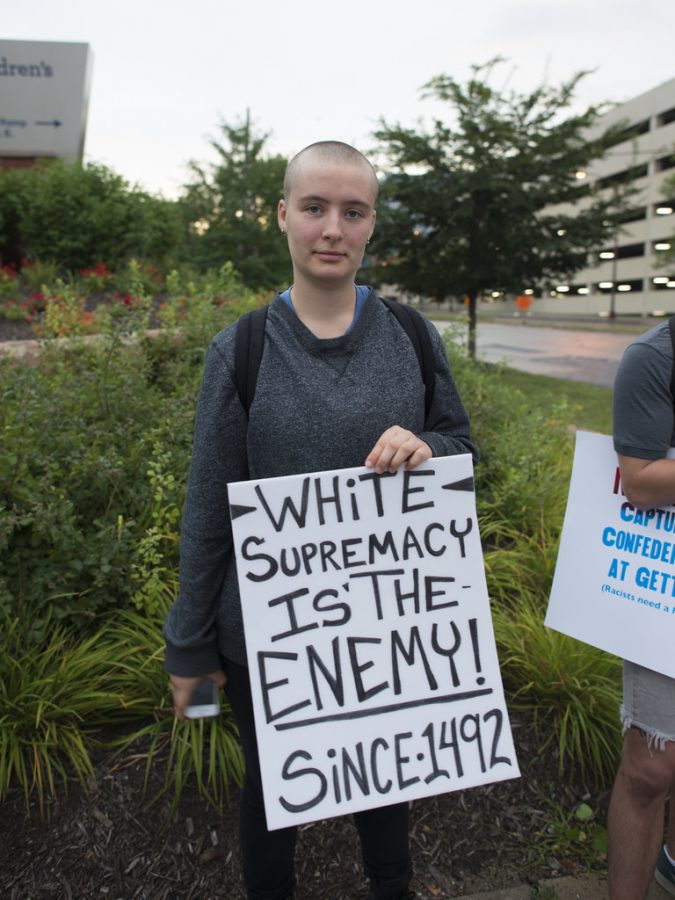New white affinity group on campus

A white protestor at an anti-racism protest holds her sign.
January 9, 2019
“People of color shouldn’t always have to be the ones to educate white people about racism and oppression. We are taking responsibility for learning about racism, our own white privilege, and how to challenge it as white people.” This is the first point in a statement of purpose that precludes the application for Masters’ new affinity group WARE, White Anti-Racist Educators. The group is headed by faculty and students whose aims are to provide an educational space on campus for white members of the community to learn about anti-racism, privilege, and diversity. WARE’s goals and intentions were developed over the past months by chemistry teacher and tenth grade Class Dean Eric Shear and Eva Seligman of CityTerm, with the help of senior Thomas West and junior Audrey Corrigan, as well as Karen Brown, Director of Equity and Inclusion.
One of the central aims of the group is to discuss white privilege and to help make white students aware of the importance in being an ally, even though the experience of being a member of a marginalized group may not directly affect them.
“I think once everybody examines themselves and learns more about privilege and race and everything else that goes with it we can come together and have the dialogue and the conversation of how we can help each other move forward,” Brown said.
West acknowledges that it can be difficult or intimidating at times to participate in a setting like Diversity Ambassadors where the majority of people have directly experienced cultural appropriation and microaggressions. “Essentially, we wanted to create a space for students who didn’t necessarily feel comfortable talking about diversity with people of color because you can slip up so easily and suddenly people shut down and immediately assume a person is ignorant,” West said.
Shear agreed with West and recognized the sensitive nature of the topics of discussion. “We don’t want kids to be worried about saying something,” he said. “This group needs to be a space where people really think.”
Shear was motivated to form the group after attending a conference surrounding the topic of white privilege where he discussed its effects. “Something that is hard to understand is that you’re complicit in a system that is terrible to a lot of people, and it can be earth-shattering at first to realize that,” Shear said. “I will very seldom experience oppression, but I wanted to know, ‘How can I make a difference?’”
Another point of inspiration was the group AWARE LA, an activist organization in Los Angeles which self-defines as “an alliance of white anti-racists.” AWARE LA’s initiatives as an alliance include hosting monthly dialogues about identity and privilege and White People 4 Black Lives, a program which challenges cultural and institutional racism.
Helping people within the Masters community to become allies is integral to the mission of the new group’s student and faculty leadership, according to Brown and WARE leaders.
“It is a group for white students to educate themselves free of judgement, but also gives the responsibility to them to become allies. White people should be taking the initiative to educate themselves on how to make sure people of color in our lives are being respected and understood,” West said.
WARE is set apart from other affinity groups at Masters is that, similarly to Diversity Ambassadors, it requires an application. The application form, which prompts students to review what they are most passionate about and what they consider most pertinent when discussing issues of race and diversity, is meant to provide a background to structure meeting agendas.
The group’s emphasis on helping its members become allies is similar to that of Diversity Ambassadors, which sponsors diversity- and inclusion-oriented events and similarly discusses issues of identity and equality, although within a group of African and African-American, Asian, Latinx, Middle Eastern, and LGBTQ+ students. Brown hopes that each student who goes through WARE will be inspired to become an ally and an ambassador of inclusion, even if not officially for the Diversity Ambassadors.
“This is a group of people who are saying, you know what, just because we are white, doesn’t mean that we can’t be allies. It doesn’t mean that we can’t and don’t want to discuss our affinity for social justice and understanding diversity. I think that there is a group of people who have that in common and would like to be able to get together in a safe space and talk about it,” Brown said.
The educational space will include two separate groups, one for students and one exclusive to faculty, with both working towards different aims. The faculty group will be centered more on reflection, while the student group will be presented with information upfront to ground the subject of discussion with supplementary reading or video material. Once both groups have developed a foundation, they will begin to meet together to exchange thoughts and ideas, and in the future plan to host a crossover meeting with Diversity Ambassadors as well.
“There are going to be moments that are challenging, but we expect that people are present with their best intent,” Shear said.



Kenneth Richardson • Jun 14, 2021 at 7:26 PM
Hello,
I am a middle school teacher at a middle school in seattle and our white affinity group is interested in creating a newsletter for our school to educate our colleagues. I wanted to reach out and say thank you for your work!